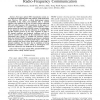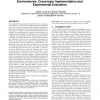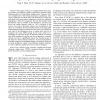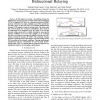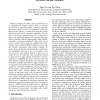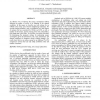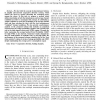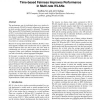94
Voted
TWC
2010
14 years 8 months ago
2010
Abstract--Free-space optical (FSO) transmission systems enable high-speed communication with relatively small deployment costs. However, FSO suffers a critical disadvantage, namely...
131
Voted
TON
2010
14 years 8 months ago
2010
Accurately selecting modulation rates for time-varying channel conditions is critical for avoiding performance degradations due to rate overselection when channel conditions degra...
139
click to vote
TCOM
2010
14 years 9 months ago
2010
Abstract--This paper develops an amplify-and-forward relaying scheme for multiuser wireless cooperative networks under frequency-selective block-fading. Single-carrier frequency di...
148
Voted
CORR
2010
Springer
14 years 9 months ago
2010
Springer
We consider an opportunistic spectrum access (OSA) problem where the time-varying condition of each channel (e.g., as a result of random fading or certain primary users' activ...
133
Voted
ICC
2009
IEEE
14 years 12 months ago
2009
IEEE
In this paper, we present a forwarding strategy for bidirectional relaying channels in which trellis
137
click to vote
MASS
2010
15 years 2 days ago
2010
With the popularity of wireless devices and the increase of computing and storage resources, there are increasing interests in supporting mobile computing techniques. Particularly...
119
Voted
ICASSP
2010
IEEE
15 years 4 days ago
2010
IEEE
An effective way of reducing the energy consumption without affecting the quality of service is by adapting to the channel conditions. In this paper we describe one such scheme fo...
117
click to vote
PE
2007
Springer
15 years 1 months ago
2007
Springer
To develop simple traffic engineering rules for the downlink of a cellular system using Proportional Fairness (PF) scheduling, we study the “strict” and “approximate” ins...
110
click to vote
TWC
2008
15 years 2 months ago
2008
We deal with the concept of physical-layer fairness in amplify and forward cooperative diversity systems, which reflects the need for equally allocating the consumed power among th...
141
click to vote
USENIX
2004
15 years 3 months ago
2004
The performance seen by individual clients on a wireless local area network (WLAN) is heavily influenced by the manner in which wireless channel capacity is allocated. The popular...
